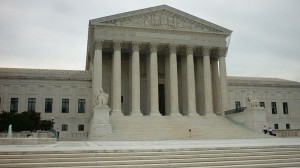 WASHINGTON — The United States Supreme Court heard oral argument yesterday in the case of Proposition 8, the ballot initiative that banned homosexual ‘marriage’ in the state. There was, however, no mention of God, the author of marriage, during the scope of the oral argument before the high court. Instead, the argument in support of upholding the ban centered around whether or not homosexuals can procreate.
WASHINGTON — The United States Supreme Court heard oral argument yesterday in the case of Proposition 8, the ballot initiative that banned homosexual ‘marriage’ in the state. There was, however, no mention of God, the author of marriage, during the scope of the oral argument before the high court. Instead, the argument in support of upholding the ban centered around whether or not homosexuals can procreate.
The justices appeared to be sharply divided as they considered the matter and wary of going too far, too fast. None of them spoke up for a sweeping ruling that would require every state to change its marriage laws.
However, Justice Anthony Kennedy, who likely holds the deciding vote for the court, said that he was troubled by the effect of Proposition 8 on the nearly 40,000 children in California who are being raised by same-sex couples. The court should hear “the voice of these children,” he said. “They want their parents to have full recognition and full status” that goes with marriage. On the other hand, Kennedy warned against taking the court and the nation “into unchartered waters” or over a “cliff.”
Listen to the oral argument before the court at the conclusion of the article.
Attorney Charles Cooper, who argued in favor of keeping California’s ban on homosexual “marriage,” told the court that the main reason for marriage was procreation, but spoke nothing of God. The liberal justices on the bench beat back against Cooper, as Justice Elena Kagan asked if people who are no longer of childbearing age, such as those over 55, should then be denied the right to marry.
“Lots of people who get married can’t have children,” Justice Stephen Breyer contended.
When it came his time to speak, Justice Anontin Scalia tackled the issue from the United States Constitution. Things became a bit heated as he engaged in dialogue with attorney Ted Olson, former Solicitor General for then President George W. Bush.
“When did it become unconstitutional to exclude homosexual couples from marriage?” Scalia asked.
“There’s no specific date in time,” Olson replied after a few moments of debate. “This is an evolutionary cycle.”
Justice Samuel Alito said that the timing might not be right for the court to hear cases on the issue of homosexual “marriage.”
“You want us to step in and render a decision based on an assessment of the effects of this institution which is newer than cell phones or the Internet,” Alito remarked. “On a question like that, of such fundamental importance, why should it not be left for the people, either acting through initiatives and referendums or through their elected public officials?”
Obama appointee Justice Sonia Sotomayor asked Olson where the line would be drawn if the court did indeed uphold same-sex “marriage.”
“Mr. Olson, the bottom line that you’re being asked, and it is one that I’m interested in the answer: If you say that marriage is a fundamental right, what state restrictions could ever exist?” Sotomayor inquired. “Meaning, what state restrictions with respect to the number of people, with respect to the incest laws, the mother and child, assuming that they are the age — I can accept that the state has probably an overbearing interest on protecting a child until they’re of age to marry, but what’s left?”
Both Cooper and Olson state that following yesterday’s oral argument before the court, they remain uncertain as to how the justices will rule.
The court will hear argument today surrounding efforts to overturn the nation’s Defense of Marriage Act.
Listen to the argument made before the U.S. Supreme Court here:
[soundcloud url=”http://api.soundcloud.com/tracks/85026601" params=”color=ff6600&auto_play=false&show_artwork=true” width=” 100%” height=”166" iframe=”true” /]
Become a Christian News Network Supporter...


